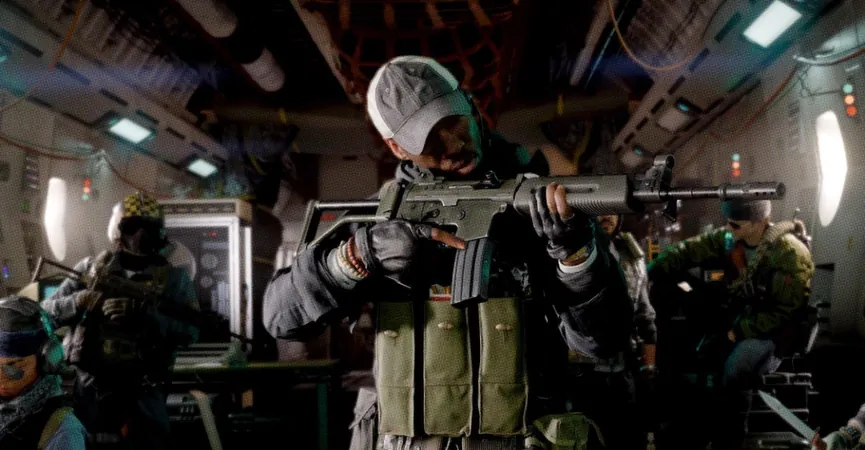
Shocking Development Costs of Call of Duty Games Unveiled: $700 Million for Cold War!
2025-01-07
Author: Wei
Introduction
In a startling revelation, a recent court filing disclosed that three Call of Duty titles released between 2015 and 2020 amassed a jaw-dropping total of nearly $2 billion in development costs. This shocking figure, first reported by Game File and later reviewed by Polygon, surfaced during an ongoing 2024 lawsuit against Activision Blizzard, where families of victims affected by the tragic Uvalde, Texas, school shooting are suing the company for allegedly promoting gun culture to children. Interestingly, Meta, the parent company of Instagram, has also been implicated in the proceedings.
Development Costs Breakdown
The court document—filed on December 23, 2024—was presented by Patrick Kelly, the creative mind behind the Call of Duty franchise, to bolster Activision's case for dismissal of the lawsuit. The financial details shared in the filing shed light on an industry notorious for guarding its internal statistics closely. While previous incidents, such as a court error revealing that *The Last of Us Part II* cost approximately $220 million, or leaked documents showing *Spider-Man 2* costing $300 million, offered rare glimpses into game development budgets, the numbers disclosed by Kelly surpass expectations.
Staggering Figures
The breakdown is staggering: *Call of Duty: Black Ops 3* (2015) racked up $450 million in its three-year development, selling 43 million copies. Meanwhile, *Call of Duty: Modern Warfare* (2019) ran up a staggering bill exceeding $640 million over "several years" of development while achieving sales of 41 million units. The pièce de résistance, however, is *Call of Duty: Black Ops Cold War* (2020), which reportedly cost a massive $700 million to develop and has sold 30 million copies to date.
Financial Viability of Activision
Despite these colossal costs, Activision appears to be on solid financial ground. The company announced a remarkable $8.8 billion in net revenue in 2021, a rise from $8.09 billion in 2020. In-game purchases, predominantly from downloadable content and microtransactions, contributed significantly with net bookings hitting $5.1 billion compared to $4.85 billion the previous year. However, there is a troubling trend: as game budgets soar, sales figures are witnessing a modest decline, raising concerns about the sustainability of such exorbitant development practices.
Scope of Development Costs
Kelly's filings hint at a comprehensive scope of what these development costs encompass. It's suggested that these figures take into account not only the initial game release but also the continued expenses involved in post-launch support, including salaries, technological upgrades, server needs, and ongoing content updates. While marketing costs typically aren't included in these budgets, the specifics regarding that aspect remain vague.
Unique Development Processes
An integral part of Kelly’s extensive filing also elaborates on the unique processes engaged in game development. For instance, *Call of Duty: Modern Warfare* employed real-life ex-Navy SEALs as consultants to guide the game's design, ensuring that military operations were portrayed convincingly and authentically. Their influence extended to motion capture performances, further enhancing realism in cinematics and gameplay.
Attention to Detail and Innovation
Moreover, the development teams dedicated significant efforts to detail and authenticity—from designing realistic environments dotted with not just war debris, but also minute details like custom soda can labels, further immersing players in the game world. With the adoption of cutting-edge techniques like photogrammetry and real-time ray tracing, the graphics quality set a new standard in gaming. These tools enable developers to create intricate 3D models and realistic environments, exemplified in the meticulously crafted *Piccadilly Circus* map.
Conclusion
As the court case unfolds, the financial realities of developing blockbuster video games like Call of Duty continue to deserve careful examination. With massive budgets and declining sales figures raising eyebrows, the industry might be approaching a crucial turning point. What does this mean for the future of gaming? Only time will tell, but one thing is for certain—hold on tight, because the gaming industry is in for a wild ride!

 Brasil (PT)
Brasil (PT)
 Canada (EN)
Canada (EN)
 Chile (ES)
Chile (ES)
 Česko (CS)
Česko (CS)
 대한민국 (KO)
대한민국 (KO)
 España (ES)
España (ES)
 France (FR)
France (FR)
 Hong Kong (EN)
Hong Kong (EN)
 Italia (IT)
Italia (IT)
 日本 (JA)
日本 (JA)
 Magyarország (HU)
Magyarország (HU)
 Norge (NO)
Norge (NO)
 Polska (PL)
Polska (PL)
 Schweiz (DE)
Schweiz (DE)
 Singapore (EN)
Singapore (EN)
 Sverige (SV)
Sverige (SV)
 Suomi (FI)
Suomi (FI)
 Türkiye (TR)
Türkiye (TR)
 الإمارات العربية المتحدة (AR)
الإمارات العربية المتحدة (AR)